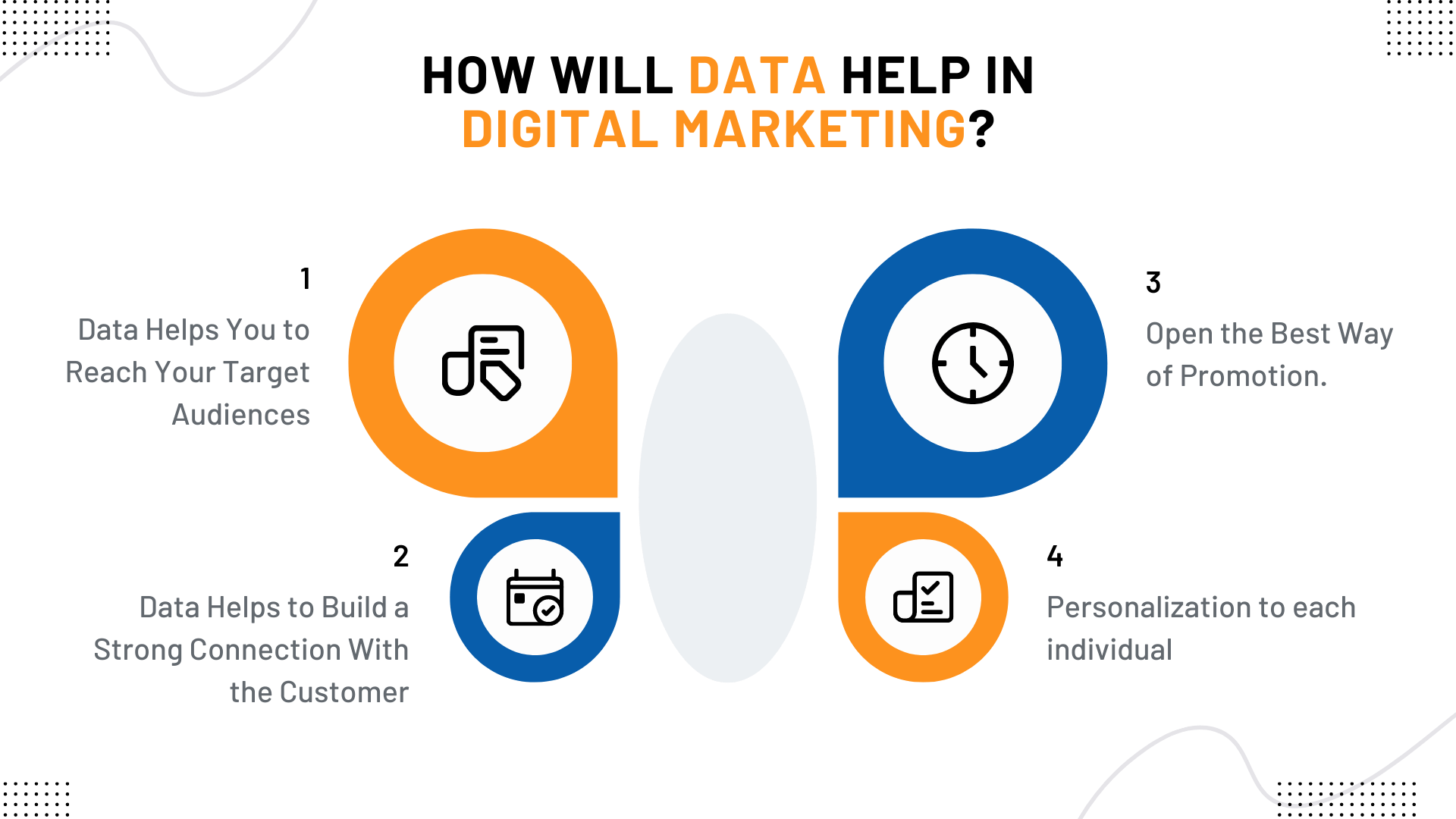How to Utilize Data for a Successful Digital Marketing Campaign?

How to Utilize Data for a Successful Digital Marketing Campaign?
Simply put, marketing refers to learning about and meeting a target market’s requirements. It is a crucial responsibility for any company since effective marketing campaigns may bring in a flood of new customers. Examining target demographics, product portfolio, and competitive landscape are all part of the standard marketing cycle. However, digital marketing is relatively recent, despite the historical and cultural significance of marketing in the commercial world.
Many companies have begun trying out new kinds of advertising since the advent of digital technology, particularly the widespread use of personal computers and mobile devices. Now, in the modern day, digital marketing is just as crucial as conventional tactics.
What Is Digital Marketing?
Digital marketing, in a nutshell, encompasses all forms of advertising executed using electronic gadgets that rely on some computer. This also includes any internet-based marketing initiatives. Websites, search engines, blogs, social media, video, email, and other digital mediums may all be used in digital marketing.
In contrast, to “one-way” or “static” marketing, which is how traditional marketing is commonly described, digital marketing is a fluid, ever-evolving process. In contrast to traditional advertising mediums like billboards and print ads, which do not allow two-way interaction between a company and its customers, digital marketing allows such interactions.
Benefits of Digital Marketing

Benefits for those who are experts in utilizing digital platforms can be as varied as the strategies used in digital marketing. Digital marketing, in its broadest sense, allows businesses to connect with clients as they go about their everyday online activities like browsing social media, reading articles, watching videos, etc.
- Global Reach: Among the many advantages of digital marketing is its worldwide reach, which includes the following: Digital marketing, in contrast to more conventional approaches, is not limited to a small geographical radius. Users can access the internet from any location in the world. As a result, many conventional obstacles that once prevented firms from reaching customers in other states or countries have been eliminated.
- Reduced Barriers to Entry: The global reach of digital marketing will increase more by using regular methods. Plus, digital marketing requires minimum effort and minimum cost.
- Improves Targeting: Marketing online allows organizations to aim at very narrow subsets of potential clients, resulting in a higher conversion rate. Companies have a far better chance of reaching their intended audience if they focus on a niche in the industry or social channels.
- Quick Link: Most 21st-century buyers read product reviews and research online before buying. A search engine is often used as the initial tool in this procedure. Successful SEO, SEM, and PPC campaigns instantly allow firms to reach out to customers.
- Relationship development: In recent years, social media has become the preferred contact method for an increasingly wide range of consumer subsets. Therefore, companies that use SMM (Social Media Marketing) effectively can strengthen their bonds with their current clientele and attract new ones.
What Is the Use of Data in Digital Marketing?
When it comes to giving clients a tailored experience, Data is crucial. Customers appreciate being treated uniquely and are more likely to abandon a brand if they are flooded with generic marketing materials.
“Data-driven marketing” refers to refining brand messaging in response to collecting user data. Marketers who are data-driven analyze past and present client interactions to anticipate their wants and requirements. This information is crucial for creating targeted marketing campaigns with a good return on investment (ROI).
There have always been two primary goals for each marketing campaign. The first step is to identify what those who will be buying from you want and need. After gaining that understanding, you may give the people what they want to buy. For an in-depth understanding of the same, you can learn the digital marketing certification course and get certification from top platforms over the web.
How will Data Help in Digital Marketing?
Listed below are some of the ways digital marketing helps businesses:
1. Data Helps You to Reach Your Target Audiences
By collecting any data, marketers can hone in on who they need to reach. Marketers can use insights from customer relationship management systems to anticipate customer behavior better.
Effective marketing strategies help in reliably reaching target audiences at optimal times with the intended messages.
2. Data Helps to Build a Strong Connection With the Customer
Marketers may better connect with their target audience with the use of data. And they can do it on a large scale as well! Thanks to the abundance of data generated by a virtually unlimited number of media, devices, platforms, and channels, marketers can now provide highly personalized experiences for millions of customers. Say, as an illustration, using real-time data, marketing campaigns can be fine-tuned in response to customers’ activity. As a result, they could consistently roll out a campaign that could meet the needs of their target audience.
3. Open the Best Way of Promotion.
Data may indicate more than just the likes and dislikes of the target audience; it may also guide the best platforms for future and present audience engagement with a brand.
This knowledge would then allow them to spread the word to the people most likely interested in it.
4. Personalization
Marketers that want to keep their clients interested must tailor their efforts to each individual. Data can help you get there. Firstly, it provides a complete portrait of the intended market. Put another way; it reveals the issues that may turn off or frustrate potential customers.
Therefore, knowing specifics about a consumer can improve a company’s ability to communicate with that person.
Conclusion
All marketing will be data-driven. Businesses that can analyze their customer data and use that knowledge to make better decisions will have a leg up on the competition. In addition, the brand loyalty and affinity fostered by data-driven marketing will continue to pay dividends long after the next game-changing technology has arrived.
Both online and offline platforms are available for digital marketing courses. You can take advantage of style="color: #007bff !important" href="https://www.mygreatlearning.com/digital-marketing/courses">digital marketing courses online to ace your career.
References:

Blog Admin:
Ravinder Bharti
CEO & Founder - Public Media Solution
About: Ravinder Bharti is the Founder and CEO of Public Media Solution,
a leading
marketing, PR, and branding company based in India.